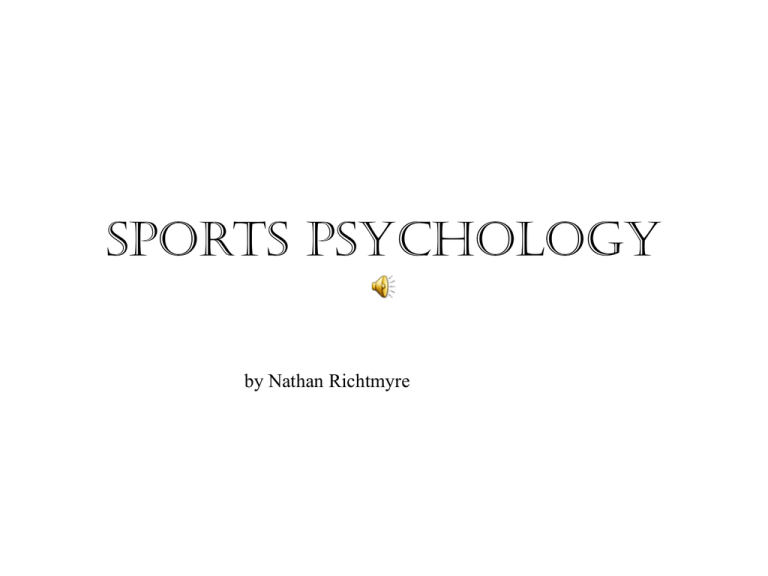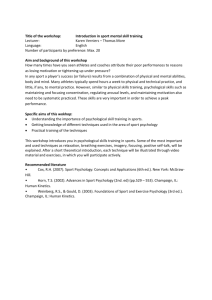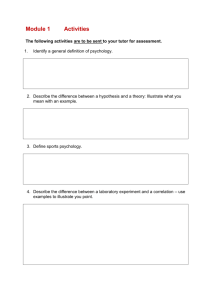Sports Psychology
advertisement

Sports Psychology by Nathan Richtmyre What is Sports Psychology • Sport and exercise psychology is defined a – the scientific study of the psychological factors that are associated with participation and performance in sport, exercise, and other types of physical activity. • According to Division 47 of the American Psychological Association, sports psychology encompasses a range of topics including "motivation to persist and achieve, psychological considerations in sport injury and rehabilitation, counseling techniques with athletes, assessing talent, exercise adherence and well-being, self-perceptions related to achieving, expertise in sport, youth sport, and performance enhancement and self-regulation techniques." A Brief History • The world’s first sport psychology laboratory was founded in 1920 by Carl Diem, a German sports administrator, and an organizer for the Berlin Olympic Games. He created the tradition of the Olympic Torch Relay. • Five years later, Cloman Griffith of the University of Illinois established the first sport psychology laboratory in North America. He then went on to published two books, The Psychology of Coaching (1926) -- the first book in sport psychology -- and The Psychology of Athletes (1928) • The first scholarly journal devoted to sport psychology, the International Journal of Sport Psychology, was established in 1970, followed in 1979 by the Journal of Sport Psychology. Is it for you Would you enjoy: • helping athletes use psychological principles to achieve optimal mental health and to improve performance • understanding how participation in sport, exercise, and physical activity affects an individual's psychological development, health, and well-being throughout the life span. Education and Training for a Career in Sport Psychology • Entry-level positions with a bachelor's degree are rare, usually taking the form of internships. Most positions require a master's or doctorate degree in clinical, counseling, or sports psychology as well as direct training and experience in apply psychology to sports and exercise. • NEEDED SKILLS and ABILITIES – possesses a knowledge of psychology and of sport along with the ability to apply psychology to sport – has a likable personality – shows a concern and care for athletes and coaches – has the ability to establish good working relationships with athletes and coaches – models team-based behaviors – expresses a willingness to learn from athletes and coaches How much can I make • BACHELOR'S DEGREE – The best option for someone at this level is to do an internship and become involved with a sports team. If paying positions are available, they tend to be in the $18-22K starting range • MASTER'S DEGREE: – Many jobs are available for those with masters degrees in this subfield. Nonetheless, people who want to utilize a broad range of skills need a doctoral degree for optimum success and to work independently, one needs need to be licensed by the state in they work. Typical pay is in the $28-32K starting range. • DOCTORAL DEGREE: – Most professional opportunities in sport psychology require doctoral degrees from accredited colleges and universities. In addition, students in counseling or clinical psychology doctoral programs usually complete post-graduate internships (normally not in sport psychology) as part of their education. Even if students with a masters degree complete sport psychology internships, these graduates compete at a distinct disadvantage for the limited number of full-time positions available in sport psychology. For more Infomation • Association for Applied Sport Psychology (AASP) http://www.aaasponline.org • North American Society for the Psychology of Sport and Physical Activity • (NASPSPA) http://www.naspspa.org • International Society of Sport Psychology (ISSP) http://issponline.org






